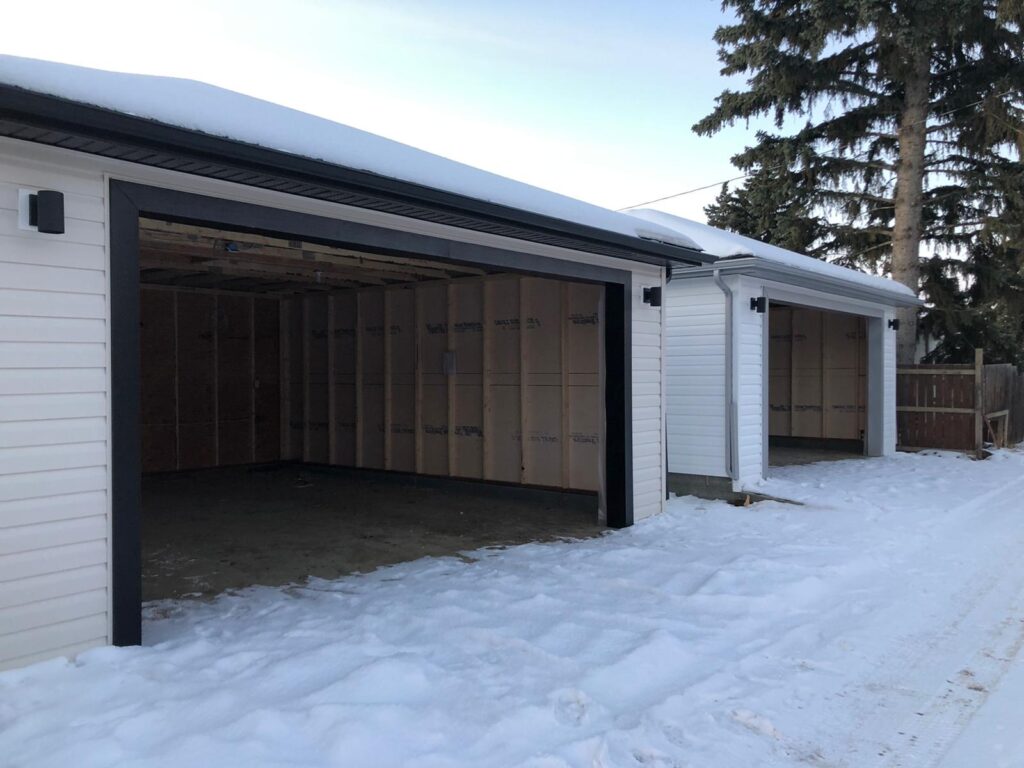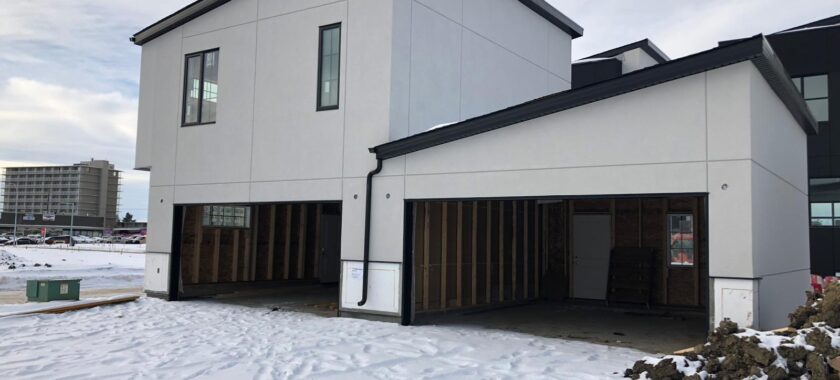A noisy garage door can be a source of annoyance and frustration for you and your neighbors. It can also indicate a serious problem with your garage door system that needs to be addressed as soon as possible. If you are experiencing a loud or squeaky garage door, you may be wondering what is causing it and how to fix it.
In this article, we will help you diagnose the cause of your garage door noise and provide you with effective solutions to quiet it down. We will also share some long-term strategies to prevent your garage door from making noise in the future. By following these tips and tricks, you will be able to enjoy a smooth and silent garage door operation.
Whether you need a garage door repair service, a garage door technician, or some garage door solutions, we are here to help. We are a local company that specializes in garage door maintenance and repair in Spruce Grove. We have the experience, skills, and tools to handle any garage door issue, big or small.
Diagnosing the Cause of Garage Door Noise
One of the first steps to fixing a noisy garage door is to find out what is causing it. There are many possible sources of garage door noise, such as:
- Worn-out or loose garage door rollers: These are the wheels that run along the metal tracks on the sides of the garage door. If they are damaged, misaligned, or lack lubrication, they can create friction and vibration, resulting in noise.
- Faulty or loose garage door hinges: These are the joints that connect the panels of the garage door. If they are loose, broken, or rusted, they can cause the door to shake and rattle, producing noise.
- Malfunctioning or misaligned garage door opener: This is the motorized device that opens and closes the garage door. If it is not working properly, or if it is not aligned with the door, it can cause the door to jerk and squeak, creating noise.
- Damaged or broken garage door springs: These are the coiled metal wires that support the weight of the garage door. If they are worn out, snapped, or out of balance, they can cause the door to sag and grind, generating noise.
To diagnose the cause of your garage door noise, you need to inspect each of these components carefully and listen for any unusual sounds. You can also use a stethoscope or a screwdriver to amplify the sound and pinpoint the location of the problem.
Here are some tips to help you identify the cause of your garage door noise:
- If the noise is coming from the rollers, you will hear a scraping or grinding sound as the door moves along the tracks. You can also check the condition of the rollers by looking for cracks, chips, or flat spots on them.
- If the noise is coming from the hinges, you will hear a rattling or clanking sound as the door panels flex and bend. You can also check the tightness of the hinges by wiggling them with your hand or a wrench.
- If the noise is coming from the opener, you will hear a humming or whirring sound as the motor runs. You can also check the alignment of the opener by measuring the distance between the door and the opener rail at various points.
- If the noise is coming from the springs, you will hear a popping or snapping sound as the door lifts or lowers. You can also check the balance of the springs by disconnecting the opener and manually opening the door halfway. If the door stays in place, the springs are balanced. If the door falls or rises, the springs need adjustment.
While identifying the source of the noise is important, repairing garage doors can be complex and risky. For your safety and to ensure a proper fix, it’s highly encouraged to seek assistance from a professional garage door technician or a garage door service. They have the expertise, tools, and experience to safely and effectively resolve any issues with your garage door.
Effective Solutions for Quieting Your Garage Door
Once you have diagnosed the cause of your garage door noise, you can apply some effective solutions to quiet it down. Depending on the problem, you may need to replace, repair, or adjust some parts of your garage door system.
Here are some of the most common and effective solutions for quieting your garage door:
- Replace the garage door rollers: If your rollers are worn out, damaged, or made of metal, you can replace them with new ones that are made of nylon or rubber. These materials are quieter and smoother than metal, and they also require less lubrication. To replace the rollers, you will need to remove the old ones from the hinges and slide the new ones into the tracks. Make sure to choose the right size and type of rollers for your garage door model.
- Lubricate the garage door hinges: If your hinges are loose, rusted, or squeaky, you can lubricate them with a garage door lubricant spray or a silicone-based oil. These products will reduce friction and noise, and also protect the hinges from corrosion. To lubricate the hinges, you will need to spray or apply the lubricant on the hinge pins and joints, and then wipe off any excess. Make sure to use a product that is specifically designed for garage doors, and avoid using grease or WD-40, as they can attract dirt and dust.
- Adjust or replace the garage door opener: If your opener is malfunctioning, misaligned, or noisy, you can adjust or replace it with a new one that is quieter and more efficient. To adjust the opener, you will need to check the settings and the alignment of the opener rail and the door. You can also use rubber isolators or anti-vibration pads to reduce the vibration and noise from the motor. To replace the opener, you will need to choose a new one that is compatible with your garage door model and features. You can also opt for a belt-drive or a direct-drive opener, which are quieter than a chain-drive opener.
- Repair or replace the garage door springs: If your springs are damaged, broken, or out of balance, you can repair or replace them with new ones that are stronger and quieter. To repair the springs, you will need to adjust the tension and the balance of the springs using a winding bar and a wrench. To replace the springs, you will need to remove the old ones and install the new ones using the same tools. Make sure to use the right size and type of springs for your garage door model and weight. You should also be very careful when handling the springs, as they are under a lot of pressure and can cause serious injury if mishandled.
DIY garage door solutions might seem appealing it is best for a professional garage door service to fix the garage door issues. Doing it yourself might lead to more complications and costly repairs.

Long-Term Strategies to Prevent Garage Door Noise
Fixing a noisy garage door is not a one-time solution. You need to take some preventive measures and perform regular maintenance to keep your garage door quiet and smooth for a long time.
Here are some of the best practices for preventing garage door noise:
- Clean and inspect your garage door regularly: Dirt, dust, and debris can accumulate on your garage door components and cause them to wear out faster and make noise. You should clean your garage door at least once a month with a soft cloth and a mild detergent. You should also inspect your garage door for any signs of damage, corrosion, or misalignment, and fix them as soon as possible.
- Lubricate your garage door periodically: Lubrication is essential for reducing friction and noise on your garage door parts. You should lubricate your garage door at least twice a year, preferably before the winter and summer seasons. You should use a garage door lubricant spray or a silicone-based oil, and apply it on the rollers, hinges, springs, and opener. You should avoid using grease or WD-40, as they can attract dirt and dust.
- Replace your garage door parts when needed: Even with proper cleaning and lubrication, your garage door parts will eventually wear out and need to be replaced. You should replace your garage door parts when they show signs of damage, such as cracks, chips, flat spots, rust, or breaks. You should also replace your garage door parts when they reach their lifespan, which is usually around 10,000 cycles for the springs, and 15,000 cycles for the rollers and hinges.
- Hire a professional garage door service: Some garage door problems are too complex or dangerous to handle by yourself, such as adjusting or replacing the springs, or installing a new opener. You should hire a professional garage door service to handle these tasks, as they have the expertise, tools, and safety measures to do them correctly and safely. A professional garage door service can also perform a thorough inspection and tune-up of your garage door, and provide you with the best garage door solutions for your needs.
Conclusion
We hope this article has helped you understand how to fix a noisy garage door and prevent it from happening again. A noisy garage door can be annoying, disruptive, and potentially dangerous. It can also affect the value and curb appeal of your home. That’s why you need to take care of it as soon as possible.
If you need any help with your garage door repair in Spruce Grove, you can count on us. We are Iceberg Overhead Doors, a local company that provides high-quality garage door solutions for residential and commercial customers. We have been in the business for over 10 years, and we have a team of experienced and certified garage door technicians who can handle any garage door issue, big or small.
We offer a wide range of garage door services and we are committed to providing you with the best garage door service in Spruce Grove. We use only the best materials and equipment, and we follow the highest standards of safety and quality. We also offer competitive prices and flexible financing options. We guarantee your satisfaction and peace of mind.
Don’t let a noisy garage door ruin your day. Contact us today and let us take care of it for you. We are available 24/7, and we can provide you with a free estimate and a same-day service. We look forward to hearing from you and serving you.
Frequently Asked Questions
How often should I lubricate my garage door?
You should lubricate your garage door at least twice a year, preferably before the winter and summer seasons. This will help reduce friction and noise, and also extend the lifespan of your garage door components.
How can I tell if my garage door springs are broken or damaged?
Some of the signs of broken or damaged garage door springs are a loud bang when the door opens or closes, a gap in the spring coil, a sagging or uneven door, or a door that is too heavy to lift manually.
How much does it cost to repair or replace a garage door part?
The cost of repairing or replacing a garage door part depends on several factors, such as the type and size of the part, the extent of the damage, the labor and materials required, and the service provider.









